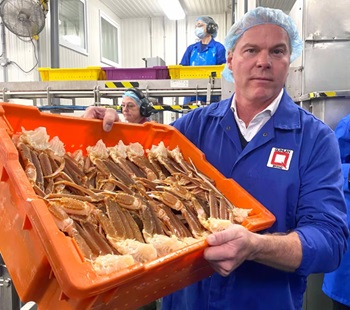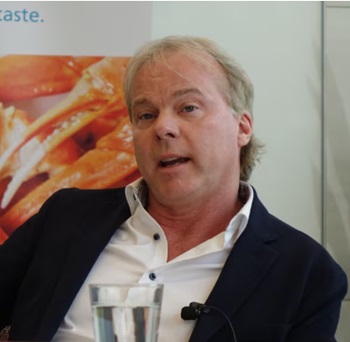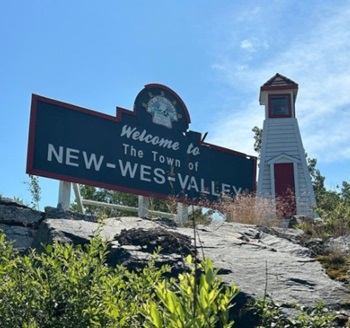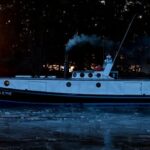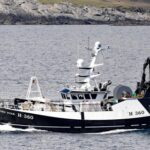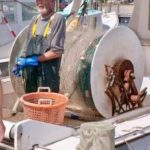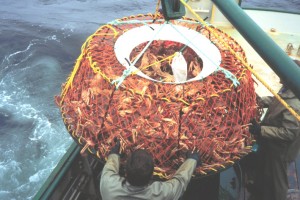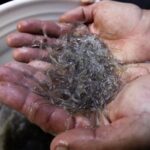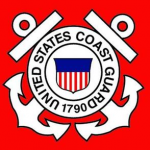Tag Archives: Newfoundland
Atlantic lobster industry could be hurt by tariffs from China, U.S.
 Atlantic Canada’s $2.9-billion lobster industry could be impacted by tariffs imposed by the United States and China, an industry spokesperson said Tuesday. “At the moment we really don’t know how much impact there will be,” said Geoff Irvine, executive director of the Halifax-based Canadian Lobster Council. China imposed a 25 per cent tariff on Canadian seafood March 20, and U.S. President Donald Trump has threatened to begin tariffs on Canadian products on April 2. Tariffs on Atlantic Canada’s lucrative lobster fishery were among the topics of discussion at the Maritime Fishermen’s Union annual convention, held in Moncton Monday and Tuesday. Irvine said Atlantic Canada exports approximately $2.9 billion worth of lobster annually, with 67 per cent going to the United States and 20 per cent going to China. more, >>CLICK TO READ<< 08:34
Atlantic Canada’s $2.9-billion lobster industry could be impacted by tariffs imposed by the United States and China, an industry spokesperson said Tuesday. “At the moment we really don’t know how much impact there will be,” said Geoff Irvine, executive director of the Halifax-based Canadian Lobster Council. China imposed a 25 per cent tariff on Canadian seafood March 20, and U.S. President Donald Trump has threatened to begin tariffs on Canadian products on April 2. Tariffs on Atlantic Canada’s lucrative lobster fishery were among the topics of discussion at the Maritime Fishermen’s Union annual convention, held in Moncton Monday and Tuesday. Irvine said Atlantic Canada exports approximately $2.9 billion worth of lobster annually, with 67 per cent going to the United States and 20 per cent going to China. more, >>CLICK TO READ<< 08:34
Fishing industry watches tariff battle, counting the days till spring seasons
 Like everyone, Nova Scotia’s fishing industry has been trying to parse what U.S. President Donald Trump’s tariffs will mean for them. “It’s too early to know yet,” said Geoff Irvine, executive director of the Lobster Council of Canada. There is little lobster coming ashore right now, which buys the industry time to hope for a resolution that sees the 25 per cent tariff on all Canadian products heading south dropped. Fishing will pick up later this month off southwest Nova Scotia as waters warm, and then in April seasons will start opening from Newfoundland and Prince Edward Island to Nova Scotia, with massive quantities of crustaceans coming over wharves throughout the region by May 1. more, >>CLICK TO READ<< 06:29
Like everyone, Nova Scotia’s fishing industry has been trying to parse what U.S. President Donald Trump’s tariffs will mean for them. “It’s too early to know yet,” said Geoff Irvine, executive director of the Lobster Council of Canada. There is little lobster coming ashore right now, which buys the industry time to hope for a resolution that sees the 25 per cent tariff on all Canadian products heading south dropped. Fishing will pick up later this month off southwest Nova Scotia as waters warm, and then in April seasons will start opening from Newfoundland and Prince Edward Island to Nova Scotia, with massive quantities of crustaceans coming over wharves throughout the region by May 1. more, >>CLICK TO READ<< 06:29
Berth control: NL fish harvesters hope there’s room for everyone at Little Port amid cargo ship salvage
 Some fish harvesters in the outer Bay of Islands are wondering how their livelihoods might be affected by the ongoing situation with the grounded cargo ship in Cedar Cove. The MSC Baltic III lost power and ran ashore in the cove, also known as Wild Cove, in the early morning hours of Feb. 15, 2025. For fish harvesters, Little Port is a crucial area. It’s where they base their fishing enterprises, including landing their catches and tying up when not at sea pursuing their respective quotas. John Gilbert of Humber Arm South is the skipper of a crew of five that catches crab, lobster and halibut. He is also a fleet representative for FFAW-Unifor, the union representing inshore fish harvesters and plant workers. He said harvesters have no real contingency plan if they can’t use Little Port. Photos, more, >>CLICK TO READ<< 09:10
Some fish harvesters in the outer Bay of Islands are wondering how their livelihoods might be affected by the ongoing situation with the grounded cargo ship in Cedar Cove. The MSC Baltic III lost power and ran ashore in the cove, also known as Wild Cove, in the early morning hours of Feb. 15, 2025. For fish harvesters, Little Port is a crucial area. It’s where they base their fishing enterprises, including landing their catches and tying up when not at sea pursuing their respective quotas. John Gilbert of Humber Arm South is the skipper of a crew of five that catches crab, lobster and halibut. He is also a fleet representative for FFAW-Unifor, the union representing inshore fish harvesters and plant workers. He said harvesters have no real contingency plan if they can’t use Little Port. Photos, more, >>CLICK TO READ<< 09:10
‘Andrew went above and beyond’: Lucky Seven crew member thankful for Furey’s support
 After enduring 52 hours in a life raft in the open ocean, the seven crew members were rescued and brought home to New-Wes-Valley, where a crowd of loved ones, including the premier, welcomed them home. “When I shook hands with Andrew in front of the fire hall in New-Wes-Valley, he said, ‘How are you feeling?’” Tiller recalled. “I said, ‘Jesus, I’m feeling perfect’ — he couldn’t believe it, that I was in all good spirits.” Since then, Furey has done far more than just staying in touch with the crew; Tiller said they’ve become good friends. When Tiller first heard the news of Furey’s resignation, he was shocked. Like many others, it was the last thing he expected. Photos, more, >>CLICK TO READ<< 10:55
After enduring 52 hours in a life raft in the open ocean, the seven crew members were rescued and brought home to New-Wes-Valley, where a crowd of loved ones, including the premier, welcomed them home. “When I shook hands with Andrew in front of the fire hall in New-Wes-Valley, he said, ‘How are you feeling?’” Tiller recalled. “I said, ‘Jesus, I’m feeling perfect’ — he couldn’t believe it, that I was in all good spirits.” Since then, Furey has done far more than just staying in touch with the crew; Tiller said they’ve become good friends. When Tiller first heard the news of Furey’s resignation, he was shocked. Like many others, it was the last thing he expected. Photos, more, >>CLICK TO READ<< 10:55
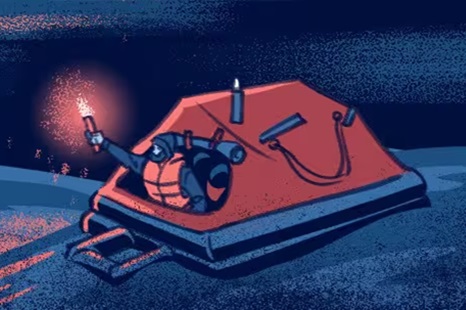
Lost at Sea
When a group of seven fishermen went missing off the northeast coast of Newfoundland in July, the small community of New-Wes-Valley was gripped with dread. Coast Guard captain Colin Roul describes the waters around Newfoundland and Labrador as dangerous and unforgiving. “Usually, when you hear distress situations like this, where no sign or sound was heard from these guys, yeah, the outcome is bleak,” he said. As 24 hours turned to 36, then 48, not much hope remained. “We knew this was going to be a regional funeral,” said Michael Tiller, mayor of New-Wes-Valley, where five of the seven men were from. “The food was ready. The place was booked. We were ready to help this town go through one of the worst disasters that it could ever go through. “But then, news of the nearly impossible — the men were found in a raft about 270 kilometres from shore. Photos, more, >>CLICK TO READ<< 07:43
F/V Elite Navigator, 10 posts, >>CLICK TO READ<<
Newfoundland towns light up harbours to honour fishers and pray for their safety
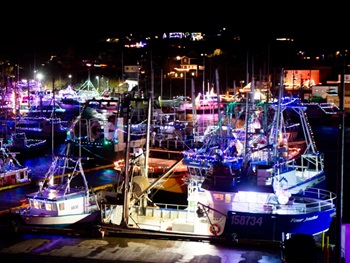 On a twinkling wharf in a small Newfoundland town, a crowd of about 100 people stopped singing and chatting on Friday night to bow their heads in a moment of silence for local fish harvesters. Now in its 26th year, the boat lighting in Port de Grave, N.L., draws visitors from all over the province, but organizers have kept the town’s fishers at the heart of the ceremony. Port de Grave’s event began with a single fisherman, Eric Lear, deciding to light up his boat on Christmas. It has since grown and now requires volunteers to direct cars from out of town into designated parking areas. more, >>CLICK TO READ<< 09:10
On a twinkling wharf in a small Newfoundland town, a crowd of about 100 people stopped singing and chatting on Friday night to bow their heads in a moment of silence for local fish harvesters. Now in its 26th year, the boat lighting in Port de Grave, N.L., draws visitors from all over the province, but organizers have kept the town’s fishers at the heart of the ceremony. Port de Grave’s event began with a single fisherman, Eric Lear, deciding to light up his boat on Christmas. It has since grown and now requires volunteers to direct cars from out of town into designated parking areas. more, >>CLICK TO READ<< 09:10
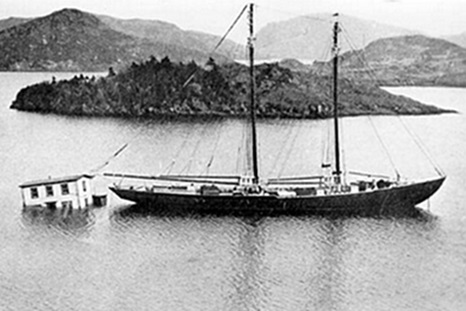
The 1929 Magnitude 7.2 “Grand Banks” earthquake and tsunami
On November 18, 1929, at 5:02 pm Newfoundland time, a major earthquake occurred approximately 250 km south of Newfoundland along the southern edge of the Grand Banks. This magnitude 7.2 tremor was felt as far away as New York and Montreal (see isoseismal map of felt area below). On land, damage due to earthquake vibrations was limited to Cape Breton Island where chimneys were overthrown or cracked and where some highways were blocked by minor landslides. A few aftershocks (one as large as magnitude 6) were felt in Nova Scotia and Newfoundland but caused no damage. More than 40 local villages in southern Newfoundland were affected, where numerous homes, ships, businesses, livestock and fishing gear were destroyed. Also lost were more than 280,000 pounds of salt cod. Total property losses were estimated at more than $1 million 1929 dollars (estimated as nearly $20 million 2004 dollars). Photos, maps, more, >>CLICK TO READ<< 10:23
FFAW celebrating decision against seafood processors in snow crab dispute
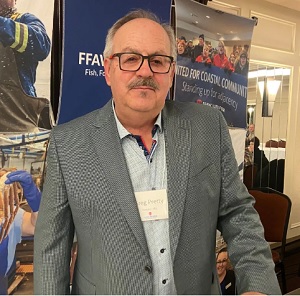 The Fish, Food and Allied Workers union is celebrating a ruling over last year’s payment dispute for snow crab that the union president estimates will net a collective $3.3 million payout for harvesters. FFAW filed the grievance against the Association of Seafood Producers (ASP) on the removal of the 20 per cent tolerance for snow crab in 2023. The tolerance had previously allowed harvesters to be paid the minimum price for their entire catch as long as the percentage of crab under four inches, but still of legal size, was less than 20 per cent. On Aug. 5 the arbiter ruled in favour of the fish harvesters union. “These processors have processing licenses from the province, and I expect them to behave in a more honourable manner than what they’ve been doing,” FFAW president Greg Pretty told CBC News. “It’s important not only that the harvesters get their money back, but that it shines a light on behaviours of crab processing companies in this province.” He said fish harvesters are owed approximately $3.3 million from 2023 from processing companies. more, >>CLICK TO READ<< 14:19
The Fish, Food and Allied Workers union is celebrating a ruling over last year’s payment dispute for snow crab that the union president estimates will net a collective $3.3 million payout for harvesters. FFAW filed the grievance against the Association of Seafood Producers (ASP) on the removal of the 20 per cent tolerance for snow crab in 2023. The tolerance had previously allowed harvesters to be paid the minimum price for their entire catch as long as the percentage of crab under four inches, but still of legal size, was less than 20 per cent. On Aug. 5 the arbiter ruled in favour of the fish harvesters union. “These processors have processing licenses from the province, and I expect them to behave in a more honourable manner than what they’ve been doing,” FFAW president Greg Pretty told CBC News. “It’s important not only that the harvesters get their money back, but that it shines a light on behaviours of crab processing companies in this province.” He said fish harvesters are owed approximately $3.3 million from 2023 from processing companies. more, >>CLICK TO READ<< 14:19
Quinlan Defends Processing of Disputed Dead Crab Prior to Court Case
 One of the largest seafood producers in the province is firing back at the provincial government after the company was charged with processing and transporting dead snow crab. Quinlan Brothers of Bay de Verde was charged with four counts of marketing fish unfit for human consumption following inspections by provincial officials on May 30th and June 29th. But company president Robin Quinlan compares the actions of the inspectors to that of judge, jury and executioner. Quinlan believed the product — about 52,000 pounds of crab with a market value of $500,000 – would be properly stored until he had his day in court. But that was not the case. more, >>CLICK TO READ<< 14:44
One of the largest seafood producers in the province is firing back at the provincial government after the company was charged with processing and transporting dead snow crab. Quinlan Brothers of Bay de Verde was charged with four counts of marketing fish unfit for human consumption following inspections by provincial officials on May 30th and June 29th. But company president Robin Quinlan compares the actions of the inspectors to that of judge, jury and executioner. Quinlan believed the product — about 52,000 pounds of crab with a market value of $500,000 – would be properly stored until he had his day in court. But that was not the case. more, >>CLICK TO READ<< 14:44
Moved by the rescue of the ‘Lucky 7,’ Gander artist creates tribute sketch
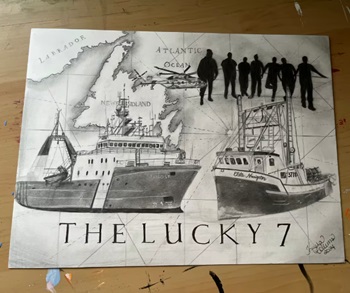 Inspired by the rescue last week of seven fishermen feared lost at sea, a Gander artist has created an artwork in tribute to the crew of the Elite Navigator. Keisha Collins created the artwork beginning shortly after the seven men were reported found. “It just kind of hit home to Newfoundland. And the fact that all seven were OK and, you know, were found safe, it was a happy ending. And it was one that Newfoundland needed to see.” A fire aboard their boat forced the crew to abandon ship into a to sink, and the men — since dubbed the “Lucky 7” — were found floating in a life-raft two days later, after using their final flare to signal search and rescue crews. Video, more, >>CLICK TO READ<< 06:54
Inspired by the rescue last week of seven fishermen feared lost at sea, a Gander artist has created an artwork in tribute to the crew of the Elite Navigator. Keisha Collins created the artwork beginning shortly after the seven men were reported found. “It just kind of hit home to Newfoundland. And the fact that all seven were OK and, you know, were found safe, it was a happy ending. And it was one that Newfoundland needed to see.” A fire aboard their boat forced the crew to abandon ship into a to sink, and the men — since dubbed the “Lucky 7” — were found floating in a life-raft two days later, after using their final flare to signal search and rescue crews. Video, more, >>CLICK TO READ<< 06:54
Dwan Street elected as president of the FFAW
 Dwan Street is celebrating her election to lead the Fish, Food & Allied Workers union, calling it a historic moment. The first woman to lead the union, Street announced her victory late Wednesday evening on her candidacy Facebook page. “Tonight, you put your faith in me and I am humbled, amazed and forever indebted,” Street wrote on her election Facebook page. The FFAW confirmed the results late Thursday morning. Street was elected over businessman Dave Callahan and Marine Institute PhD student Abe Solberg, who is also the head of FFAW policy negotiations and its fishery scientist. more, >>CLICK TO READ<< 09:39
Dwan Street is celebrating her election to lead the Fish, Food & Allied Workers union, calling it a historic moment. The first woman to lead the union, Street announced her victory late Wednesday evening on her candidacy Facebook page. “Tonight, you put your faith in me and I am humbled, amazed and forever indebted,” Street wrote on her election Facebook page. The FFAW confirmed the results late Thursday morning. Street was elected over businessman Dave Callahan and Marine Institute PhD student Abe Solberg, who is also the head of FFAW policy negotiations and its fishery scientist. more, >>CLICK TO READ<< 09:39
F/V Elite Navigator crew happy to be back on shore and plan to get back to sea as soon as they can
 Toby Peddle, one of seven fishermen who spent more than two days drifting in a life-raft on the Atlantic Ocean, still can’t believe his good fortune. Peddle said he hoped to get back fishing that evening, whereas Jordan King said he’d give himself a week. “Plan to go back when I can,” he said. Carter said it would be a couple of days before he was ready to go again. “Then I’m good to go again. I don’t want the fish to get away, right?” he said. Carter says they were making supper Wednesday when an alarm went off and a fire was discovered in the engine room. “Toby grabbed the fire extinguisher, tried to extinguish it but as soon as we thought it’d gone out, then it pretty much jumped right back at us, twice as bad,” said Carter. The calls of “fire” rang out to wake everyone up, he said. Video, photos, more, >>CLICK TO READ<< 10:46
Toby Peddle, one of seven fishermen who spent more than two days drifting in a life-raft on the Atlantic Ocean, still can’t believe his good fortune. Peddle said he hoped to get back fishing that evening, whereas Jordan King said he’d give himself a week. “Plan to go back when I can,” he said. Carter said it would be a couple of days before he was ready to go again. “Then I’m good to go again. I don’t want the fish to get away, right?” he said. Carter says they were making supper Wednesday when an alarm went off and a fire was discovered in the engine room. “Toby grabbed the fire extinguisher, tried to extinguish it but as soon as we thought it’d gone out, then it pretty much jumped right back at us, twice as bad,” said Carter. The calls of “fire” rang out to wake everyone up, he said. Video, photos, more, >>CLICK TO READ<< 10:46
My family was affected by the cod moratorium. Now that it’s lifted, I feel caught
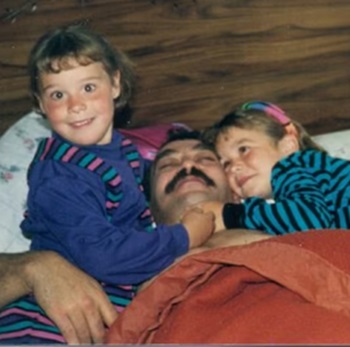 After 32 years, the northern cod moratorium is officially over. The federal government is allowing a small increase to 18,000 tonnes of catch, calling it a historic return of the fishery. While the new limit is nowhere near the catch of 250,000 tonnes allowed before the moratorium, it feels like the end of an era — one that many Newfoundlanders say has come too soon. My dad was among those who lost their jobs in the industry in the biggest layoff in Canada.in 1992. Since I was only six at the time, I didn’t realize the magnitude of what was happening, but things started to feel different in our home. Stiff like jeans dried on the clothesline. Tight like mom’s voice after a long day. My memories of the time feel as sharp as fishhooks, although in all likelihood, they’re like slippery fish. They grow in size and detail with each retelling — like the fish that got away on a weekend trip. more, >>CLICK TO READ<< 08:58
After 32 years, the northern cod moratorium is officially over. The federal government is allowing a small increase to 18,000 tonnes of catch, calling it a historic return of the fishery. While the new limit is nowhere near the catch of 250,000 tonnes allowed before the moratorium, it feels like the end of an era — one that many Newfoundlanders say has come too soon. My dad was among those who lost their jobs in the industry in the biggest layoff in Canada.in 1992. Since I was only six at the time, I didn’t realize the magnitude of what was happening, but things started to feel different in our home. Stiff like jeans dried on the clothesline. Tight like mom’s voice after a long day. My memories of the time feel as sharp as fishhooks, although in all likelihood, they’re like slippery fish. They grow in size and detail with each retelling — like the fish that got away on a weekend trip. more, >>CLICK TO READ<< 08:58
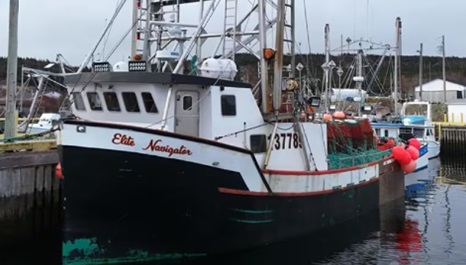
‘Nothing short of a miracle’: Missing N.L. fishing crew arrive home safely
The crew members’ safe arrival was emotional as family and friends tightly hugged the loved ones they thought they’d lost. Captain of the Elite Navigator, Eugene Carter, said the crew is happy to be home after spending almost three days in a life-raft following a fire on the ship that escalated quickly. “Within five minutes, we had seven men aboard a life-raft and there was fire around us everywhere,” Carter said. In the days that followed, Carter said the crew had to keep each other warm, there was limited water supply, and the raft kept drifting farther away from land. Nonetheless, they stayed in good spirits. “We were actually sitting around joking with each other, using the microphone, interviewing each other with the flashlight trying to keep our hopes and everything up,” he said. more, >>CLICK TO READ<< 06:26
Missing N.L. fishing crew found safe, returning home
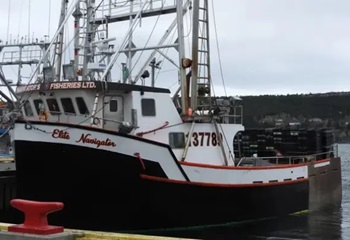 The crew of the Elite Navigator, the fishing vessel missing since Wednesday, has been found safe. The fishing vessel went missing off the northeast coast of Newfoundland, with the boat’s last known location about 300 kilometres northeast of Gander. Premier Andrew Furey posted to social media around 1 a.m. Saturday that search and rescue efforts had been a success. “Our entire province is so relieved to hear the crew members of the Elite Navigator have been found and are returning to safety to their families, who have been waiting so anxiously for this good news,” Furey posted. “Thank you to all the dedicated people involved in the search and rescue effort.” more, >>CLICK TO READ<< 06:57
The crew of the Elite Navigator, the fishing vessel missing since Wednesday, has been found safe. The fishing vessel went missing off the northeast coast of Newfoundland, with the boat’s last known location about 300 kilometres northeast of Gander. Premier Andrew Furey posted to social media around 1 a.m. Saturday that search and rescue efforts had been a success. “Our entire province is so relieved to hear the crew members of the Elite Navigator have been found and are returning to safety to their families, who have been waiting so anxiously for this good news,” Furey posted. “Thank you to all the dedicated people involved in the search and rescue effort.” more, >>CLICK TO READ<< 06:57
UPDATE: Residents of New-Wes-Valley anxious for missing fishermen to be found safe, says mayor
 A community on Newfoundland’s east coast is waiting for any news about a missing fishing vessel that is the focus of an intense search, says a mayor. The vessel, the 15-metre Elite Navigator, has not been heard from since Wednesday evening. New-Wes-Valley mayor Mike Tiller said the people of his community are worried and anxious for any updates, and hoping the vessel will be found. The missing vessel has a crew of seven. Five are from New-Wes-Valley, he said, one is from Centreville-Wareham-Trinity and another from the Gander Bay region. “They were out for a trip of turbot. I think they were due back in Valleyfield yesterday afternoon. And I guess when they didn’t show up of course that’s what set off the initial alarms,” said Tiller. more, >>CLICK TO READ<< 13:41
A community on Newfoundland’s east coast is waiting for any news about a missing fishing vessel that is the focus of an intense search, says a mayor. The vessel, the 15-metre Elite Navigator, has not been heard from since Wednesday evening. New-Wes-Valley mayor Mike Tiller said the people of his community are worried and anxious for any updates, and hoping the vessel will be found. The missing vessel has a crew of seven. Five are from New-Wes-Valley, he said, one is from Centreville-Wareham-Trinity and another from the Gander Bay region. “They were out for a trip of turbot. I think they were due back in Valleyfield yesterday afternoon. And I guess when they didn’t show up of course that’s what set off the initial alarms,” said Tiller. more, >>CLICK TO READ<< 13:41
Search Underway For Fishing Vessel Overdue off Northeast Coast
 A search is continuing for a fishing vessel reported overdue off the northeast coast of Newfoundland yesterday. The last communication with the 56-foot Elite Navigator was around 11 p.m. Wednesday night, when they were en route to Valleyfield to offload their catch. The vessel was reported overdue Thursday afternoon, with heavy fog hampering search and rescue efforts in the area. More info as it becomes available. more, >>CLICK TO READ<< 06:38
A search is continuing for a fishing vessel reported overdue off the northeast coast of Newfoundland yesterday. The last communication with the 56-foot Elite Navigator was around 11 p.m. Wednesday night, when they were en route to Valleyfield to offload their catch. The vessel was reported overdue Thursday afternoon, with heavy fog hampering search and rescue efforts in the area. More info as it becomes available. more, >>CLICK TO READ<< 06:38
Free fish and smiley faces won’t reverse Ottawa decision to unleash draggers on northern cod (although blockading St. John’s harbour would)
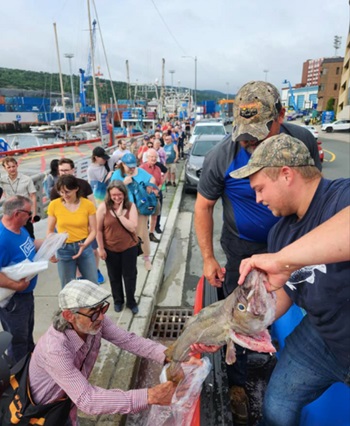 The FFAW regularly goes through protest motions, but its resolve to stand up for inshore boats is forever suspect when the union is conflicted by also representing offshore draggers, and onshore plants — and collects a paycheque from the feds. Now that Ottawa has opened the door to offshore dragging the inshore wants in on it too. Some Labrador (2J) harvesters have asked DFO to be allowed to drag for cod this year, and some 3K (northeast coast) and 3L (east coast) harvesters are right behind them with the same request. The union’s resolve against dragging for northern cod is sure to weaken. Exchanging cod for signatures won’t cut it. Blockading St. John’s harbour might be a bit extreme, but there should be a sweet spot somewhere the middle. Harvesters themselves must take a stand, like they did last spring with the snow crab price on the steps of Confederation Building. Now is the time for John Efford to rise again. more, >>CLICK TO READ<< 10:35
The FFAW regularly goes through protest motions, but its resolve to stand up for inshore boats is forever suspect when the union is conflicted by also representing offshore draggers, and onshore plants — and collects a paycheque from the feds. Now that Ottawa has opened the door to offshore dragging the inshore wants in on it too. Some Labrador (2J) harvesters have asked DFO to be allowed to drag for cod this year, and some 3K (northeast coast) and 3L (east coast) harvesters are right behind them with the same request. The union’s resolve against dragging for northern cod is sure to weaken. Exchanging cod for signatures won’t cut it. Blockading St. John’s harbour might be a bit extreme, but there should be a sweet spot somewhere the middle. Harvesters themselves must take a stand, like they did last spring with the snow crab price on the steps of Confederation Building. Now is the time for John Efford to rise again. more, >>CLICK TO READ<< 10:35
YEAH!!! Newfoundland fish harvesters crash news conference to demand reinstating of cod moratorium
 Fish harvesters in Newfoundland crashed the podium at a meeting of Canada’s environment ministers in St. John’s on Wednesday, demanding a meeting with Prime Minister Justin Trudeau over the federal government’s decision to reopen the commercial cod fishery in Newfoundland and Labrador. Moments before the start of the news conference, which was to detail two days of meetings of the Canadian Council of Environment Ministers, Newfoundland and Labrador Environment Minister Bernard Davis was interrupted by a loud siren. Glen Winslow, a St. John’s fish harvester, then walked up to meet Davis at the podium from a group of around 15 protesters. “Sorry we got to do this, my buddy, but this is too important to Newfoundland and Labrador,” Winslow said to Davis over the news conference’s microphone while the other ministers watched on. more, >>CLICK TO READ<< 17:43
Fish harvesters in Newfoundland crashed the podium at a meeting of Canada’s environment ministers in St. John’s on Wednesday, demanding a meeting with Prime Minister Justin Trudeau over the federal government’s decision to reopen the commercial cod fishery in Newfoundland and Labrador. Moments before the start of the news conference, which was to detail two days of meetings of the Canadian Council of Environment Ministers, Newfoundland and Labrador Environment Minister Bernard Davis was interrupted by a loud siren. Glen Winslow, a St. John’s fish harvester, then walked up to meet Davis at the podium from a group of around 15 protesters. “Sorry we got to do this, my buddy, but this is too important to Newfoundland and Labrador,” Winslow said to Davis over the news conference’s microphone while the other ministers watched on. more, >>CLICK TO READ<< 17:43
‘Dark day for fishery’; inshore advocates say lifting 32-year northern cod moratorium wrong way forward
 DFO’s decision to lift the northern cod moratorium and unleash foreign and domestic offshore draggers on the iconic stock when all signs point to proceeding with extreme caution amounts to a dark day for the province’s commercial fisheries. “We have learned nothing after 32 years of moratorium,” says inshore advocate Ryan Cleary. “The only thing historic about today is the relentless fisheries management failure.” Released unexpectedly Wednesday morning, DFO’s 2024 northern cod management plan reestablishes a commercial fishery for northern cod, the first since 1992, setting the total allowable catch (TAC) at 18,000 tonnes. That’s only a 5,000-tonne increase from 2023’s maximum harvest level of 12,999 tonnes, but that was under a small-scale stewardship fishery limited to inshore handlines, longlines, gillnets, and cod pots. more, >>CLICK TO READ<< 13:04
DFO’s decision to lift the northern cod moratorium and unleash foreign and domestic offshore draggers on the iconic stock when all signs point to proceeding with extreme caution amounts to a dark day for the province’s commercial fisheries. “We have learned nothing after 32 years of moratorium,” says inshore advocate Ryan Cleary. “The only thing historic about today is the relentless fisheries management failure.” Released unexpectedly Wednesday morning, DFO’s 2024 northern cod management plan reestablishes a commercial fishery for northern cod, the first since 1992, setting the total allowable catch (TAC) at 18,000 tonnes. That’s only a 5,000-tonne increase from 2023’s maximum harvest level of 12,999 tonnes, but that was under a small-scale stewardship fishery limited to inshore handlines, longlines, gillnets, and cod pots. more, >>CLICK TO READ<< 13:04
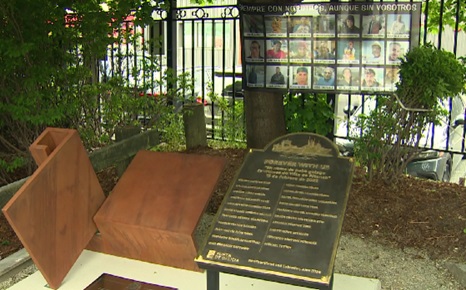
Family who lost loved ones on Spanish fishing vessel help unveil new N.L. monument
A new monument honouring 21 lives lost on a Spanish fishing boat that sank off the coast of Newfoundland in 2022 was unveiled in St. John’s on Friday by a Spanish delegation that included family of the deceased. The 50-metre-long fishing boat, called the Villa de Pitanxo, operated out of northwest Spain’s Galicia province. It sank at around 2:30 a.m. NT on Feb. 15, 2022. The crew was made up of 16 Spaniards, five Peruvians and at least three Ghanaians, and is the largest fishing disaster in Galicia in the last 50 years. Nine bodies were recovered from the water and repatriated to Spain, but the remaining 12 were never found. “The memorial is very important for the families. and all people from the sea. Fishermen, our families of the sea,” said María José de Pazo Friday. She lost her father, Francisco. Video, more, >>CLICK TO READ<< 18:36
Canadian Independent Redfish Harvesters Trash Minister’s Harvest Plan: Disconnect Has Never Been More Evident
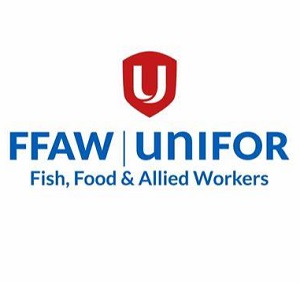 Following the announcement of the Unit 1 Redfish Management Plan and a follow-up to the Redfish Advisory Committee on Wednesday, the 3Pn4R Advisory Committee convened on Thursday night to review the proceedings. The consensus was unanimous in support of a resolution from FFAW President Greg Pretty: “Shred the document and appoint a recovery team including industry experts to ensure we have a plan that can work.” Earlier this spring, the original announcement made by Minister Lebouthillier gave away nearly 60% of the Canadian redfish quota to the corporate fleet, despite the inshore, owner-operator fleet having taken the lead on science and sustainability measures in recent years. New measures announced this week further limit harvesters by implementing unreasonable seasons, depths, gear, observer coverage, and by-catch rules. The restrictions effectively limit owner-operator participation from the inshore fleet. more, >>CLICK TO READ<< 10:11
Following the announcement of the Unit 1 Redfish Management Plan and a follow-up to the Redfish Advisory Committee on Wednesday, the 3Pn4R Advisory Committee convened on Thursday night to review the proceedings. The consensus was unanimous in support of a resolution from FFAW President Greg Pretty: “Shred the document and appoint a recovery team including industry experts to ensure we have a plan that can work.” Earlier this spring, the original announcement made by Minister Lebouthillier gave away nearly 60% of the Canadian redfish quota to the corporate fleet, despite the inshore, owner-operator fleet having taken the lead on science and sustainability measures in recent years. New measures announced this week further limit harvesters by implementing unreasonable seasons, depths, gear, observer coverage, and by-catch rules. The restrictions effectively limit owner-operator participation from the inshore fleet. more, >>CLICK TO READ<< 10:11
Newfoundland fisherman says police broke his leg during protest that delayed budget
 Richard Martin is spending this year’s fishing season on land after he says a Royal Newfoundland Constabulary officer broke his left leg in three places during a protest last month that shut down the provincial legislature. The 52-year-old fisherman had just seen two officers on horseback approaching fish harvesters demonstrating outside the legislature on the morning of March 20, the day Newfoundland and Labrador’s Liberal government was expected to deliver its annual budget. Martin doesn’t like horses — he was kicked by one as a child, he said in an interview Tuesday — and he was moving to edge of the crowd to get away. more, >>CLICK TO READ<< 09:50
Richard Martin is spending this year’s fishing season on land after he says a Royal Newfoundland Constabulary officer broke his left leg in three places during a protest last month that shut down the provincial legislature. The 52-year-old fisherman had just seen two officers on horseback approaching fish harvesters demonstrating outside the legislature on the morning of March 20, the day Newfoundland and Labrador’s Liberal government was expected to deliver its annual budget. Martin doesn’t like horses — he was kicked by one as a child, he said in an interview Tuesday — and he was moving to edge of the crowd to get away. more, >>CLICK TO READ<< 09:50
Uncle, nephew who died at sea in Lark Harbour tragedy remembered
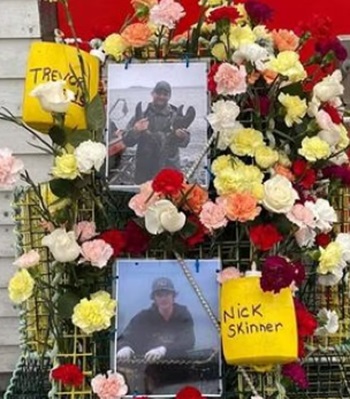 Two generations of a family were lost after a boat capsized on Newfoundland’s west coast this weekend, leaving a community in mourning. On Sunday morning, after a vessel carrying six people capsized, the Canadian Coast Guard ship Cape Edensaw was dispatched from Lark Harbour to the west coast. The coast guard launched a fast rescue craft into the water, recovering two bodies. They were Trevor Childs and his nephew Nicholas Skinner, says Fish, Food & Allied Workers secretary-treasurer Jason Spingle. News of the deaths travelled across Newfoundland and Labrador on Sunday and drew condolences from government officials and members of the fishing industry. Photos, more, >>CLICK TO READ<< 17:30
Two generations of a family were lost after a boat capsized on Newfoundland’s west coast this weekend, leaving a community in mourning. On Sunday morning, after a vessel carrying six people capsized, the Canadian Coast Guard ship Cape Edensaw was dispatched from Lark Harbour to the west coast. The coast guard launched a fast rescue craft into the water, recovering two bodies. They were Trevor Childs and his nephew Nicholas Skinner, says Fish, Food & Allied Workers secretary-treasurer Jason Spingle. News of the deaths travelled across Newfoundland and Labrador on Sunday and drew condolences from government officials and members of the fishing industry. Photos, more, >>CLICK TO READ<< 17:30
‘It doesn’t feel real,’ says Lark Harbour deputy mayor following death of 2 fishermen
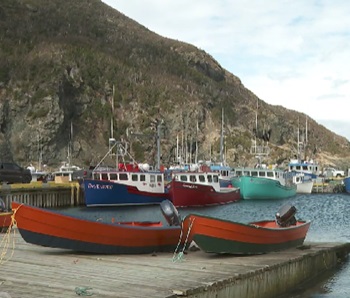 The Newfoundland community of Lark Harbour has been rocked by the deaths of two fishermen, who died after a boat capsized Sunday. The Canadian Coast Guard ship Cape Edensaw was dispatched from Lark Harbour on Sunday to the rugged shoreline of Newfoundland’s west coast and launched a fast rescue craft into the water. The crew soon recovered the two bodies and spotted four survivors on the shoreline. Lark Harbour Deputy Mayor Ria MacDonald said much of the town found out near lunchtime on Sunday. “‘Reeling’ is the only word to really use. Nobody expects to lose anyone, let alone on the first day of the season.… And the way it went down, from what I understand, is devastating,” MacDonald said Monday. Video, more, >>CLICK TO READ<< 11:45
The Newfoundland community of Lark Harbour has been rocked by the deaths of two fishermen, who died after a boat capsized Sunday. The Canadian Coast Guard ship Cape Edensaw was dispatched from Lark Harbour on Sunday to the rugged shoreline of Newfoundland’s west coast and launched a fast rescue craft into the water. The crew soon recovered the two bodies and spotted four survivors on the shoreline. Lark Harbour Deputy Mayor Ria MacDonald said much of the town found out near lunchtime on Sunday. “‘Reeling’ is the only word to really use. Nobody expects to lose anyone, let alone on the first day of the season.… And the way it went down, from what I understand, is devastating,” MacDonald said Monday. Video, more, >>CLICK TO READ<< 11:45
Two people dead, four others make it to shore after vessel capsizes in Newfoundland
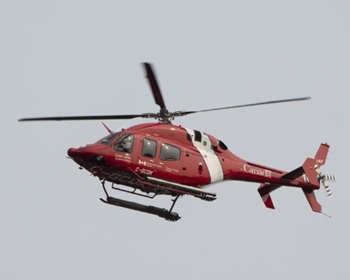 The Department of Fisheries and Oceans says two people were found dead and four others survived after a boat capsized off the west coast of Newfoundland. The department says the Canadian Coast Guard received a report of people in the water near the fishing town of Lark Harbour at around 11 a.m. Sunday after a seven-metre fishing vessel called Miss Jenny capsized with six people aboard. The coast guard issued a mayday relay to vessels in the area and its team, equipped with a fast rescue craft, along with a Cormorant helicopter based in Gander, N.L., were dispatched to help the people. more, >>CLICK TO READ<< 06:41
The Department of Fisheries and Oceans says two people were found dead and four others survived after a boat capsized off the west coast of Newfoundland. The department says the Canadian Coast Guard received a report of people in the water near the fishing town of Lark Harbour at around 11 a.m. Sunday after a seven-metre fishing vessel called Miss Jenny capsized with six people aboard. The coast guard issued a mayday relay to vessels in the area and its team, equipped with a fast rescue craft, along with a Cormorant helicopter based in Gander, N.L., were dispatched to help the people. more, >>CLICK TO READ<< 06:41
UPDATED: Four people airlifted to hospital after vessel capsized off Newfoundland’s west coast
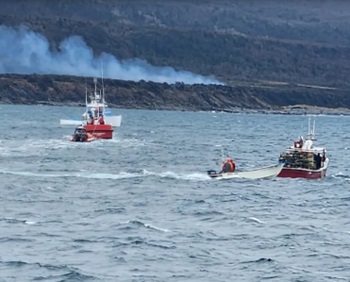 Four people were airlifted from a beach on the west coast of Newfoundland on Sunday morning and brought to hospital after a vessel was found capsized. RCMP spokesperson Cpl. Jolene Garland said the incident was near the community of Lark Harbour. In a post on the Town of Lark Harbour Facebook page, it was announced the town hall would be opened Sunday evening “as a gathering spot for our residents to support each other in this time of grief.” There was also a post telling residents to avoid Park & Youden Road. Captain Trevor Ackland, a spokesperson for the Joint Task Force Atlantic in support of the Joint Rescue and Coordination Centre in Halifax, said the centre responded to a call from the Maritime Rescue Sub-Centre in St. John’s for assistance after reports of people in the water. more, >>CLICK TO READ<< 16:46
Four people were airlifted from a beach on the west coast of Newfoundland on Sunday morning and brought to hospital after a vessel was found capsized. RCMP spokesperson Cpl. Jolene Garland said the incident was near the community of Lark Harbour. In a post on the Town of Lark Harbour Facebook page, it was announced the town hall would be opened Sunday evening “as a gathering spot for our residents to support each other in this time of grief.” There was also a post telling residents to avoid Park & Youden Road. Captain Trevor Ackland, a spokesperson for the Joint Task Force Atlantic in support of the Joint Rescue and Coordination Centre in Halifax, said the centre responded to a call from the Maritime Rescue Sub-Centre in St. John’s for assistance after reports of people in the water. more, >>CLICK TO READ<< 16:46






